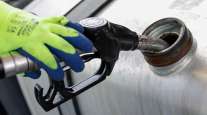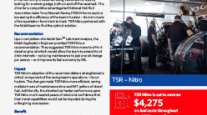Diesel Price Remains Unchanged at $3.067
This story appears in the Nov. 8 print edition of Transport Topics.
The U.S. retail diesel average remained at $3.067 a gallon last week, leaving the price virtually unchanged for three weeks, the Department of Energy reported.
Since Oct. 11, diesel prices have risen 0.1 cent, a level of stability that hasn’t occurred over a three-week period in at least seven years, based on DOE statistics.
That’s a sharp contrast to the summer of 2008, when diesel jumped 22.6 cents a gallon in a single week as prices neared the record of $4.764 a gallon in July.
The retail gasoline average didn’t change much either, dropping 1.1 cents to $2.806 last week from the week before and 1.3 cents over the past three weeks.
However, on a year-to-year basis, diesel is up 9% from $2.808 a gallon, while gas is up 4% from $2.694.
Cindy Urban, president of Klapec Trucking Co., Oil City, Pa., welcomed the recent fuel price stability, telling Transport Topics “it’s nice to know what your bills are going to be.”
She cited a benefit beyond the actual price, saying that stability helps Klapec to better plan efforts to reward drivers through steps such as 401(k) contributions.
“We like to give back to our employees,” she said.
How long the prices of diesel, gasoline and crude oil, the underlying factor in the fuel picture, stay stable remains to be seen.
Phil Flynn, analyst at PFGBest Research, Chicago, said he believes fuel prices could fall about 10 cents a gallon because the Federal Reserve has announced plans on Nov. 3 to pump $600 billion into the economy.
Another uncertainty for oil prices, he said, is the renewed focus on terrorism after explosives were found in air cargo shipments from Yemen.
He estimated that oil prices include about $5 a barrel to account for the prospect of terrorist disruptions, an amount that could change if potential attacks increase.
Still another destabilizing factor is tightening fuel inventories, which climbed to the highest level in six months. That may have helped to also send crude prices to their highest level in six months, settling at $86.49 a barrel on Nov. 4 on the New York Mercantile Exchange.
“Based on history, stability in oil markets isn’t something we should expect to continue,” said Tancred Lidderdale, a DOE analyst.
The federal agency expects fuel prices to climb gradually, with diesel predicted to rise to $3.14 a gallon on average next year.
Fleets such as Klapec use a combination of incentives and fuel-saving devices while drivers are resting to control fuel costs.
Klapec installed auxiliary power units on some of its 75 tractors, and uses the IdleAire system for in-cab temperature control on other units, Urban said.
IdleAire charges $1.50 an hour for its service, about half the price of idling that can burn a gallon of diesel hourly.
On the incentive side, Urban said, the company gives a monthly bonus of $25 to $100.
Urban also said that drivers who post the best fuel mileage by avoiding sharp speed changes can drive up to 68 miles per hour instead of being limited to 65 by speed governors.
“If a driver complains that they can’t go fast, I tell them take their foot off the pedal, and voila, you’ll be able to go faster in the future,” she said.
Limiting tractor speed to 63 mph is a key to fuel cost control at Dupré Logistics, CEO Reggie Dupré said.
To motivate drivers, the Lafayette, La., company posts all drivers’ fuel efficiency performance every week.
The scores are generated by GreenRoad technology in the company’s 350 trucks, which has helped improve fuel mileage by 0.2 miles per gallon to 0.3 miles per gallon, President Tom Voelkel said.
“The posting, accountability and peer group pressure is a real benefit,” he said. “Guys have pride and they want to do well.”
Dupré has tried autoshift transmissions and single-wide tires, but neither lived up to his expectations, Voelkel said.
The company, which transports fuel and offers logistics services, buys between 15% and 20% of its fuel in advance, hoping to save if prices subsequently climb.
Contract fuel purchases are a focus for Jacobson Transport Inc., Wahpeton, N.D., said Rick Miller, vice president of northern operations for the 50-unit agricultural and construction materials fleet.
“When we are bidding on contracts where customers want us to lock in a fuel surcharge, that’s the only way to protect yourself,” said Miller.
Jacobson relies on terminal fuel purchases to keep prices low and urges drivers to shop for prices in Minnesota and the Dakotas.




